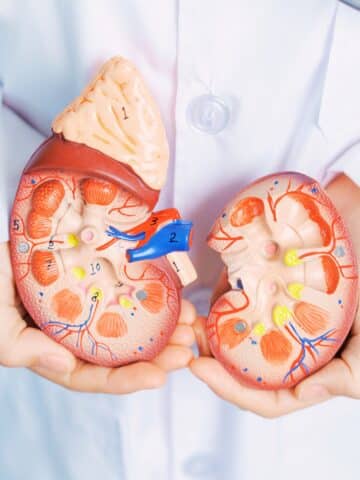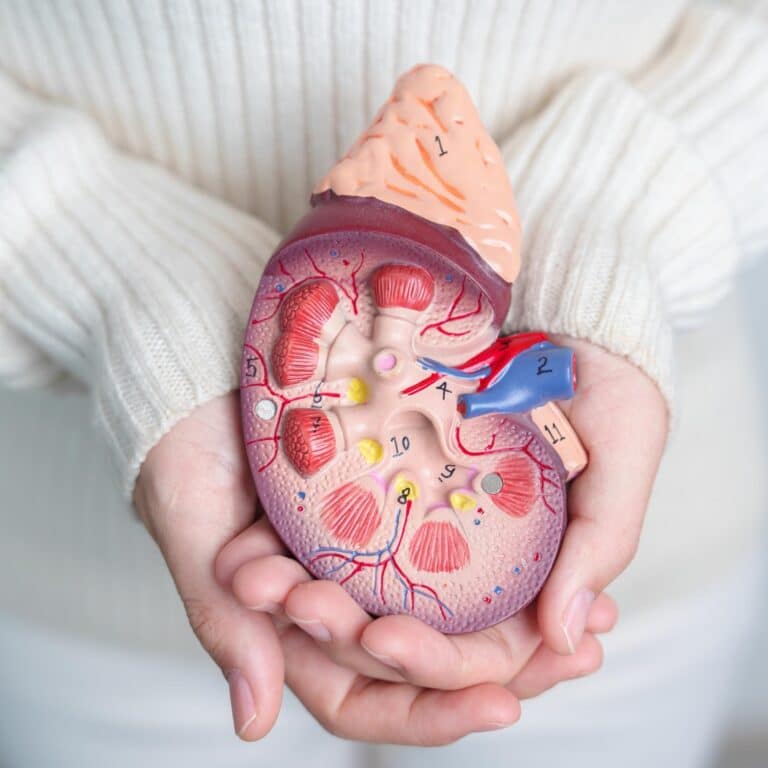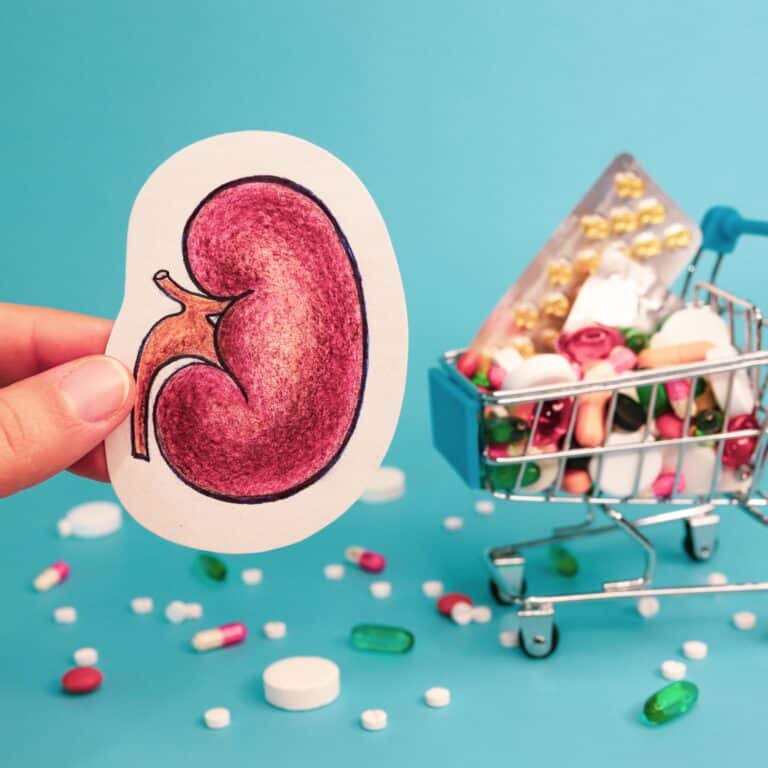Medicine for Kidney Disease
Navigating the world of medications for Chronic Kidney Disease (CKD) can be a complex journey. As individuals progress through different stages of CKD, the medication landscape evolves, presenting unique challenges and considerations.
From managing blood pressure and addressing electrolyte imbalances to tackling complications like anemia and bone disease, the role of medications is pivotal in preserving kidney function and overall health.
In this article, we will delve into the various medications commonly prescribed for CKD, their purposes, potential side effects, and the importance of close collaboration with healthcare providers to develop a personalized medication regimen tailored to individual needs and CKD stage.
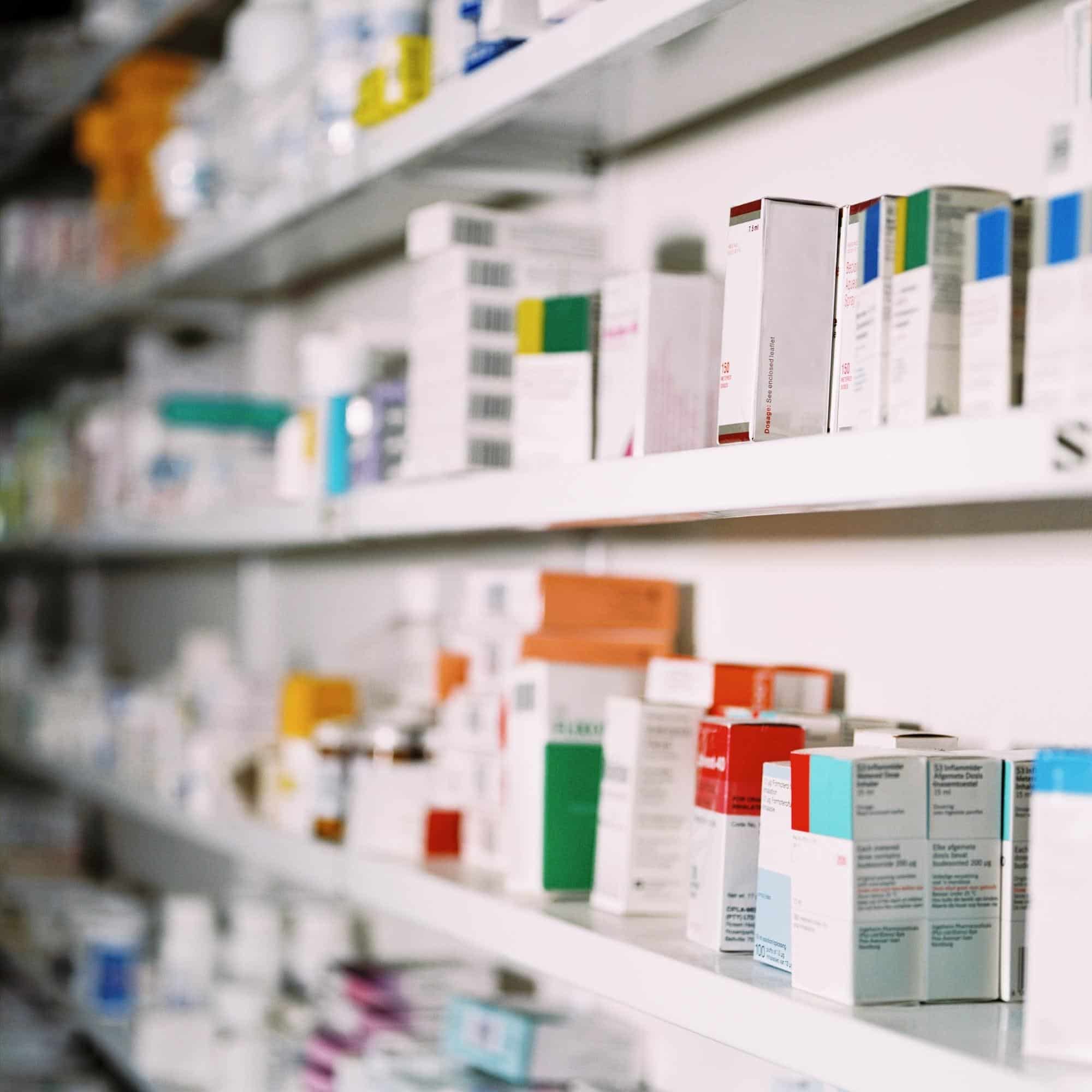
Jump to:
- Key Takeaways
- Using Medication As A Treatment For CKD
- Risks and Precautions With Kidney Disease Medications
- Managing Kidney Disease With Insulin and Diabetes Medications
- High Blood Pressure and Heart Disease Medications for Kidney Health
- Treatments for Anemia and Metabolic Acidosis in Kidney Patients
- Addressing Bone Disease in Kidney Patients
- Exploring Dialysis as a Treatment Option
- The Journey Towards Kidney Transplant
- Practical Tips for Proper Medication Use in Kidney Disease
- Frequently Asked Questions
- Medications are Indispensable in CKD Management
Key Takeaways
- Medication is a complex process for treating CKD, and understanding its effectiveness and potential side effects is crucial.
- Pharmaceutical treatments can slow CKD progression but cannot cure it. Lifestyle modifications and natural remedies can complement medication treatment.
- Medication interactions and common side effects should be considered, and precautions should be taken, including avoiding self-medication and regularly updating with the doctor.
- ACE and ARB medications can help slow down CKD progression by reducing proteinuria, but they should not be relied on solely. Kidney-friendly diet, fluid restrictions, exercise, and lifestyle modifications also contribute to slowing down CKD progression.
Using Medication As A Treatment For CKD
Medications play a vital role in the management of Chronic Kidney Disease, addressing specific complications and preserving kidney function. However, navigating medication use in CKD requires caution. Kidney impairment can alter drug metabolism and excretion, potentially leading to adverse effects.
This section explores the essential role of medications in CKD management, the precautions necessary to ensure safe and effective treatment, and the importance of healthcare provider guidance in tailoring medication regimens for CKD patients.
For More Recipes and Ideas --->> Get Your Free Meals and Recipes That Are Perfect for Pre-Dialysis Diets, Pre-Dialysis with Diabetes, or Dialysis Diets.
Medication Necessity in CKD
Medications are essential in Chronic Kidney Disease management due to several reasons. First and foremost, they can help control and reduce the progression of underlying conditions that often accompany CKD, such as high blood pressure and diabetes. Effective management of these comorbidities can slow down kidney function decline.
Additionally, medications can address complications arising from CKD itself, including anemia, bone disease, and electrolyte imbalances. Medications like erythropoietin-stimulating agents (ESAs) can boost red blood cell production in anemic CKD patients, while phosphate binders help control high phosphorus levels.
Furthermore, medications can help manage symptoms and improve overall quality of life in CKD patients. Pain management, anti-nausea drugs, and medications to control itching are examples of how pharmaceutical interventions can alleviate discomfort associated with advanced CKD.
Medications are crucial tools in CKD management, as they address both underlying conditions and CKD-related complications, ultimately promoting better kidney health and patients' overall well-being.
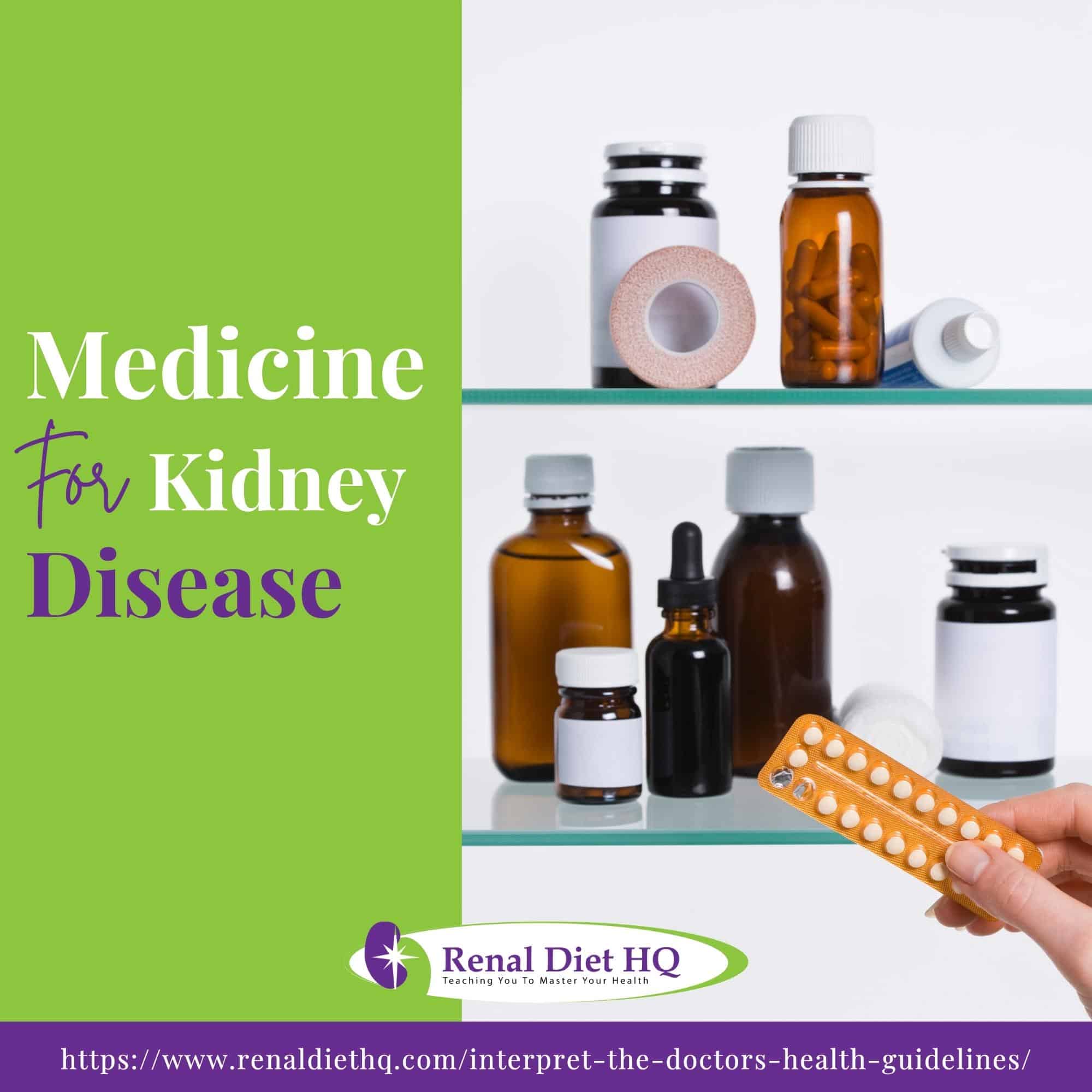
CKD-Associated Conditions That Need Management
Chronic Kidney Disease frequently accompanies various conditions that demand specific medication management:
- Hypertension (High Blood Pressure): Controlling blood pressure is paramount in CKD management. Medications like angiotensin-converting enzyme (ACE) inhibitors or angiotensin II receptor blockers (ARBs) are often prescribed.
- Diabetes: For CKD patients with diabetes, blood sugar control is critical. Medications like insulin, metformin, or sulfonylureas may be needed, along with lifestyle changes.
- Anemia: CKD can lead to anemia due to reduced erythropoietin production. Erythropoiesis-stimulating agents or iron supplements are used to manage anemia.
- Hyperphosphatemia: Medications called phosphate binders help control high phosphorus levels.
- Bone Disease: CKD-mineral and bone disorder (CKD-MBD) may require vitamin D analogs, calcimimetics, or phosphate binders.
- Fluid and Electrolyte Imbalances: Diuretics may be prescribed to manage fluid retention and electrolyte imbalances.
- Cardiovascular Disease: Statins, antiplatelet drugs, and anticoagulants are often used to manage cardiovascular risk factors associated with CKD.
- Metabolic Acidosis: Medications like sodium bicarbonate help correct metabolic acidosis.
Proper medication management, tailored to individual CKD stages and comorbidities, is crucial for slowing disease progression and maintaining overall health. It should always be done under the guidance of healthcare professionals.
Risks and Precautions With Kidney Disease Medications
As you manage your kidney disease with medication, it's vital to understand the potential risks associated with these treatments.
It's not just about taking pills; you need to be aware of possible side effects and interactions.
Furthermore, knowing the necessary precautions can help in mitigating these risks and ensure a safe treatment journey.
Medication Risks
Medication risks are elevated in Chronic Kidney Disease due to altered drug metabolism and impaired kidney function. One significant concern is the potential for heightened side effects. CKD patients may be more sensitive to drugs, making adverse reactions more likely. Furthermore, self-medication poses a risk, as over-the-counter medications, herbal remedies, and supplements can interact with prescribed drugs, exacerbating kidney damage.
Another critical aspect is nephrotoxic drugs, which can directly harm the kidneys. Nonsteroidal anti-inflammatory drugs (NSAIDs), certain antibiotics, and contrast dyes are examples of nephrotoxic agents that should be used cautiously or avoided in CKD patients.
Overall, medication risks in CKD underscore the importance of close collaboration with healthcare providers. They can prescribe medications, monitor for side effects, and ensure that drug regimens are safe and optimized to minimize risks and support kidney health. Self-medication should be avoided, and any new medication or supplement should be discussed with a healthcare professional.
Precautionary Measures
Medication use in Chronic Kidney Disease patients necessitates careful precautions due to the distinct challenges posed by compromised kidney function. Several critical factors mandate vigilance in medication management. Firstly, CKD can lead to drug accumulation in the body, raising the risk of toxic effects. This necessitates adjustments in dosages or selection of medications with minimal kidney clearance.
Secondly, impaired kidney function may reduce a drug's effectiveness, requiring dosage adaptations to attain desired therapeutic outcomes. Furthermore, the increased likelihood of drug interactions due to multiple medications in CKD patients is a significant concern. Some drugs may exacerbate kidney damage or interact adversely with others, underscoring the need for careful selection and monitoring.
Given the fluctuating nature of kidney function and the potential for heightened sensitivity to drug side effects in CKD patients, close collaboration with healthcare providers is imperative. They can tailor medication regimens, monitor kidney function, and mitigate risks associated with medication use in CKD.
Managing Kidney Disease With Insulin and Diabetes Medications
Managing kidney disease when diabetes is a coexisting condition involves a carefully tailored approach. In this section, we delve into the nuances of handling kidney disease while effectively managing blood sugar levels especially when dealing with diabetes mellitus.
Insulin and various diabetes medications are central to this discussion, offering valuable insights into how these treatments can be optimized to preserve kidney function, alleviate complications, and enhance overall quality of life for individuals facing the dual challenge of kidney disease and diabetes.
Insulin Usage in Kidney Disease
Insulin plays a vital role in managing Chronic Kidney Disease for patients with renal diabetes, where diabetes and kidney disease coexist. Renal diabetes typically involves insulin resistance and impaired insulin secretion due to kidney damage. Insulin therapy becomes essential for several reasons:
- Blood Sugar Control: Insulin helps regulate blood glucose levels effectively, which is crucial in preventing further kidney damage. It ensures that glucose is taken up by cells for energy, reducing the burden on the kidneys.
- Reduction of Glucose Spikes: Insulin can quickly lower elevated blood sugar levels, preventing sharp glucose fluctuations that can stress the kidneys.
- Protection of Kidney Function: Maintaining stable blood sugar levels through insulin therapy helps preserve the remaining kidney function and slow down CKD progression.
- Management of Comorbidities: Renal diabetes often accompanies other diabetes-related complications, such as neuropathy and retinopathy. Insulin therapy aids in managing these conditions as well.
In sum, insulin therapy is a crucial component of comprehensive CKD care for renal diabetes patients. It promotes stable blood sugar control, protects kidney function, and reduces the risk of further complications, contributing significantly to improved patient outcomes.
Diabetes Medicines and CKD
Several diabetes medications play a crucial role in slowing down the progression of Chronic Kidney Disease.
Metformin, for instance, improves insulin sensitivity, helping control blood sugar levels and reducing the strain on the kidneys.
Sodium-glucose cotransporter-2 (SGLT2) inhibitors like empagliflozin and canagliflozin lower blood glucose levels by promoting glucose excretion in the urine, while also demonstrating kidney-protective effects.
Furthermore, dipeptidyl peptidase-4 (DPP-4) inhibitors such as sitagliptin can be beneficial for CKD patients, as they have a low risk of hypoglycemia and may reduce proteinuria.
These diabetes medications, along with lifestyle modifications, are pivotal in managing CKD-related diabetes and preserving kidney function, underscoring their significance in comprehensive CKD care.
High Blood Pressure and Heart Disease Medications for Kidney Health
Managing kidney health involves addressing conditions like high blood pressure and heart disease that often accompany Chronic Kidney Disease. In this section, we explore the significance of medications designed to control blood pressure and heart-related issues.
These medications not only alleviate symptoms but also play a pivotal role in slowing down CKD progression. Understanding their mechanisms and impact is essential for comprehensive CKD management and enhancing both kidney health and overall well-being.
Choosing Suitable Hypertension Medications
Selecting appropriate hypertension medications for individuals with kidney disease requires careful consideration due to the potential impact on kidney function. Here are some crucial factors to keep in mind:
- ACE Inhibitors and ARBs: These are often the first-line choices for hypertension in kidney disease due to their kidney-protective effects. ACE inhibitors and ARBs can help reduce proteinuria and slow CKD progression. However, their use may require monitoring for potential increases in potassium levels.
- Calcium Channel Blockers: These drugs, such as amlodipine, can effectively lower blood pressure without affecting kidney function. They are particularly suitable when ACE inhibitors or ARBs are not tolerated.
- Diuretics: Loop diuretics like furosemide may be used in some cases to manage fluid retention and blood pressure. However, they should be used cautiously to avoid dehydration.
- Beta-Blockers: These may be prescribed when other medications are not suitable, but they are generally less kidney-friendly.
- Combination Therapy: Combining different classes of antihypertensive medications may be necessary to achieve target blood pressure levels while minimizing side effects.
Ultimately, the choice of hypertension medication for individuals with kidney disease should be individualized, taking into account the specific circumstances and kidney function. Regular monitoring by healthcare providers is essential to assess the medication's effectiveness and its impact on kidney health.
More on ACE and ARB Medications
ACE (Angiotensin-Converting Enzyme) inhibitors and ARBs (Angiotensin Receptor Blockers) are two classes of medications that have proven highly effective in slowing down the progression of Chronic Kidney Disease. They primarily work by targeting the renin-angiotensin-aldosterone system (RAAS), which plays a central role in regulating blood pressure and kidney function.
- Blood Pressure Control: Both ACE inhibitors and ARBs lower blood pressure by dilating blood vessels. By maintaining optimal blood pressure levels, they reduce the strain on the kidneys, which is critical in preserving kidney function.
- Reduction in Proteinuria: These medications also decrease proteinuria, the presence of excess protein in the urine. High levels of proteinuria are associated with kidney damage, and ACE inhibitors and ARBs help mitigate this effect.
- Anti-Inflammatory and Antioxidant Effects: These drugs have additional benefits, such as reducing inflammation and oxidative stress within the kidneys, further protecting them from damage.
- Delaying Dialysis: By slowing CKD progression, ACE inhibitors and ARBs may delay the need for dialysis or kidney transplant in some patients.
It's essential to use these medications under medical supervision, as their dosages and effects may vary among individuals. However, they remain key components in CKD management, significantly contributing to better kidney health and patient outcomes.
Heart Disease Medications Importance
Heart disease medications are of paramount importance in patients with Chronic Kidney Disease because individuals with CKD are at a significantly higher risk of cardiovascular complications. Here's why these medications are crucial:
- Risk Reduction: CKD patients have an elevated risk of heart disease, including conditions like heart attacks and strokes. Medications like statins, antiplatelet drugs, and anticoagulants can lower the risk of these events.
- Blood Pressure Control: CKD often coexists with high blood pressure, which is a major risk factor for heart disease. Medications like beta-blockers, ACE inhibitors, and ARBs help control blood pressure, reducing cardiovascular strain.
- Management of Heart Failure: CKD can lead to heart failure. Medications like diuretics and ACE inhibitors improve heart function and alleviate symptoms.
- Preventing Arrhythmias: Certain heart medications, like antiarrhythmics and beta-blockers, can help manage irregular heart rhythms, which are common in CKD patients.
- Overall Cardiovascular Protection: Heart disease medications reduce the burden on the heart and blood vessels, mitigating the risk of cardiovascular events and enhancing overall quality of life.
In CKD, where cardiovascular complications are a significant concern, heart disease medications are essential in preserving heart health, minimizing complications, and improving patient outcomes. Regular consultation with healthcare providers is crucial to tailor medication regimens to individual CKD patients' needs.
Treatments for Anemia and Metabolic Acidosis in Kidney Patients
Addressing anemia and metabolic acidosis is a critical aspect of kidney disease management. In this section, we delve into the medications specifically designed to target these complications in kidney patients.
Understanding the mechanisms and significance of these treatments is pivotal in improving the quality of life for individuals facing the challenges of kidney disease, as these medications help alleviate symptoms, maintain overall health, and slow down the progression of kidney dysfunction.
Anemia Medications in CKD
Anemia is a common complication in Chronic Kidney Disease, characterized by reduced red blood cell production. It can lead to fatigue, weakness, and worsen overall health. Several medications and interventions are used to manage anemia in CKD:
- Erythropoiesis-Stimulating Agents (ESAs): These drugs, such as erythropoietin, stimulate red blood cell production in the bone marrow. They are administered by injection and can effectively alleviate anemia symptoms.
- Iron Supplements: Many CKD patients have iron deficiency anemia. Iron supplements, often given orally or intravenously, help replenish iron stores and support red blood cell production.
- Vitamin B12 and Folic Acid: These vitamins are crucial for red blood cell production. Supplements are prescribed when deficiencies are present.
- Blood Transfusions: In severe cases of anemia, especially when other treatments are ineffective, blood transfusions may be necessary to quickly boost hemoglobin levels.
The choice of treatment depends on the underlying cause and severity of anemia in CKD patients. Healthcare providers tailor interventions to individual needs to effectively manage anemia and improve quality of life. Regular monitoring ensures that treatments are optimized and adjusted as necessary.
Metabolic Acidosis Treatments
Metabolic acidosis is a common complication in Chronic Kidney Disease, marked by an imbalance in the body's acid-base equilibrium. As kidney function declines, the kidneys struggle to excrete excess acid, leading to an accumulation of acidic substances in the blood. This can result in symptoms like fatigue, muscle weakness, and impaired bone health. Medications used to manage metabolic acidosis in CKD include:
- Sodium Bicarbonate: Oral sodium bicarbonate supplements are commonly prescribed to neutralize excess acid and correct acidosis.
- Alkali Salts: Medications like sodium citrate and sodium acetate can also be used to counteract excess acid and raise blood pH levels.
- Phosphate Binders: In some cases, phosphate binders like calcium-based binders can help control metabolic acidosis by reducing phosphate levels in the blood.
- Dietary Changes: Alongside medications, dietary modifications like limiting high-acid foods can assist in managing metabolic acidosis.
The choice of medication depends on the severity of acidosis, underlying causes, and individual patient needs. Effective management of metabolic acidosis in CKD helps alleviate symptoms, preserve bone health, and improve overall quality of life for affected individuals. Regular monitoring by healthcare providers ensures that treatment regimens are tailored and optimized.
Addressing Bone Disease in Kidney Patients
Bone disease is a significant concern for individuals with kidney disease. In this section, we explore the vital role of medications in addressing bone-related complications that often accompany kidney dysfunction.
These medications not only help manage bone health but also play a crucial role in mitigating the adverse effects of kidney disease. Understanding the mechanisms and impact of these treatments is essential for comprehensive kidney disease management, offering insights into enhancing both skeletal well-being and overall quality of life.
Bone Disease Medication Options
Bone disease is a frequent complication in Chronic Kidney Disease, with renal osteodystrophy being a common manifestation. As kidney function declines, the body's ability to regulate minerals like calcium and phosphorus is impaired, leading to imbalances that affect bone health. Medications used to manage bone disease in CKD include:
- Calcium Supplements: In some cases, calcium supplements are prescribed to maintain optimal calcium levels in the blood and support bone health. However, they must be used judiciously to avoid calcium buildup in the bloodstream.
- Vitamin D Analogs: Active forms of vitamin D, such as calcitriol or paricalcitol, are used to enhance calcium absorption from the gut and regulate calcium and phosphorus levels.
- Calcimimetics: Medications like cinacalcet help control parathyroid hormone levels, reducing the risk of secondary hyperparathyroidism and bone disease.
- Phosphate Binders: These drugs help lower high phosphorus levels in CKD, preventing the depletion of calcium from the bones.
Effective management of bone disease in CKD involves a combination of medications, dietary modifications, and regular monitoring by healthcare providers. Tailoring treatment to individual needs is crucial for preserving bone health and improving patients' overall quality of life.

Importance of Vitamin Supplements
In the management of bone mineral disorders in Chronic Kidney Disease, certain vitamin supplements play a vital role in maintaining bone health:
- Vitamin D: CKD patients often have low levels of active vitamin D (calcitriol), which is crucial for calcium absorption and bone mineralization. Vitamin D supplements, such as calcitriol or paricalcitol, help correct deficiencies and support bone health.
- Vitamin C: This antioxidant vitamin may help improve bone density by promoting collagen formation, a key component of bone structure. It can be beneficial for CKD patients at risk of fractures.
- Vitamin K: Vitamin K is essential for bone health as it helps regulate calcium in bones and blood vessels. Supplementation can aid in maintaining bone density.
However, vitamin supplementation should be managed under medical supervision, as CKD patients can have unique requirements and risks. Healthcare providers can tailor supplementation to individual needs, ensuring that bone health is effectively supported while minimizing potential complications.
Exploring Dialysis as a Treatment Option
When kidney function deteriorates to End-Stage Renal Disease (ESRD), dialysis becomes a lifeline. Let's examine the various types and techniques of dialysis, including hemodialysis and peritoneal dialysis, shedding light on their benefits and considerations as recommended by your kidney doctor.
Additionally, we explore the significance of choosing the right dialysis location, be it in-center or at home, in shaping the quality of life and overall well-being for those facing the challenges of kidney failure and the necessity of regular dialysis treatments.
Dialysis Types and Techniques
Dialysis is a life-sustaining treatment for individuals with End-Stage Renal Disease (ESRD). Two primary types of dialysis, hemodialysis and peritoneal dialysis, are employed to filter waste products and excess fluids from the body:
- Hemodialysis: (HD)
- Process: In hemodialysis, blood is pumped from the patient's body through a dialysis machine, which filters it through a dialyzer or artificial kidney. Cleaned blood is then returned to the patient.
- Frequency: Typically done three times a week at a dialysis center, each session lasting 3-4 hours.
- Location: Usually conducted in a clinical setting, requiring regular visits to the center.
- Pros: Highly efficient in removing waste and excess fluids; medical professionals oversee the process.
- Peritoneal Dialysis: (PD)
- Process: Peritoneal dialysis takes place within the patient's abdomen. A special fluid, dialysate, is introduced via a catheter and absorbs waste products, which are then drained out.
- Frequency: Daily exchanges, often performed at home, providing more flexibility.
- Location: Can be done at home or work, offering greater independence.
- Pros: Offers more autonomy and less restricted dietary and fluid intake; continuous therapy provides steady toxin removal.
The choice between these methods depends on individual circumstances, lifestyle, and medical considerations, and it's typically made with the guidance of healthcare providers. Both types aim to maintain a patient's overall health and well-being while awaiting transplantation or as a long-term renal replacement therapy.
The Journey Towards Kidney Transplant
Kidney transplantation is a highly effective treatment for Chronic Kidney Disease, particularly in End-Stage Renal Disease. It involves replacing a damaged kidney with a healthy one from a living or deceased donor. This procedure offers a chance for improved quality of life, reduced reliance on dialysis, and better long-term outcomes.
While transplantation is a preferred option when feasible, it requires compatibility, donor availability, and lifelong immunosuppressive therapy to prevent organ rejection. It remains a valuable alternative to dialysis for many patients with kidney disease seeking a more permanent solution.
Transplant Eligibility Factors
Several factors determine a patient's eligibility for renal transplantation:
- Medical Suitability: Patients should be in reasonably good health overall, aside from kidney disease, and free from active infections, cancer, or severe heart disease that could complicate the transplant.
- Dialysis Status: Transplant eligibility may depend on a patient's dialysis history. Some centers require a minimum time on dialysis before transplantation.
- Age: While age alone is not a barrier, older patients must meet certain health criteria to be eligible.
- Blood Type and Compatibility: Donor-recipient blood type and tissue compatibility play a crucial role in transplant eligibility.
- Psychological Evaluation: Patients undergo assessments to ensure they can cope with the psychological and emotional demands of transplantation.
- Social Support: A strong support system is vital for post-transplant care and recovery.
- Finances: Adequate insurance or funding for transplant and lifelong immunosuppressive medications is necessary.
Each transplant center may have specific criteria, but these factors are fundamental in determining a patient's eligibility for a renal transplant.
Post-Transplant Medication Requirements
After a successful kidney transplant in Chronic Kidney Disease (CKD) patients, lifelong medication regimens are crucial. These include:
- Immunosuppressants: To prevent organ rejection, patients take drugs like tacrolimus, cyclosporine, and mycophenolate mofetil. Doses are adjusted based on individual responses.
- Corticosteroids: Prednisone or similar medications help control the immune response and reduce inflammation.
- Antiviral and Antibacterial Medications: These prevent and treat viral and bacterial infections since immunosuppressants can weaken the immune system.
- Calcium and Vitamin D Supplements: To maintain bone health, as some medications may deplete calcium.
- Blood Pressure Medicines: To manage hypertension, which is common post-transplant.
- Medications for Other Conditions: Patients may need medications for comorbidities like diabetes or high cholesterol.
Patients must adhere meticulously to their medication schedule, attend regular check-ups, and communicate any side effects or concerns to healthcare providers. Compliance is critical for graft survival and overall health post-transplant.
Practical Tips for Proper Medication Use in Kidney Disease
As you manage kidney disease, understanding the right timing and choices for your medication is crucial. It's not just about taking your drugs, it's about taking them correctly to optimize their efficacy.
Let's explore some practical tips to ensure you're using your kidney disease medication properly.
Medication Timing and Choices
Proper medication timing and choices are crucial in Chronic Kidney Disease (CKD) management:
- Medication Timing:
- Consistency is key. Take medications at the same time every day to maintain consistent drug levels in the body.
- Coordinate medication times with daily routines or alarms to avoid missing doses.
- Some medications should be taken with food, while others should be taken on an empty stomach. Follow instructions carefully.
- Medication Choices:
- Individualized treatment: Medications should be tailored to the specific stage of CKD and any underlying conditions.
- Avoid nephrotoxic drugs: Certain medications, like NSAIDs and some antibiotics, can harm the kidneys. Minimize their use when possible.
- Monitor side effects: Report any adverse effects to healthcare providers promptly to adjust medications if needed.
- Stay informed: Keep a list of medications, including over-the-counter and herbal supplements, to share with healthcare providers for safe prescribing.
Proper medication management, under healthcare guidance, can help slow CKD progression and manage associated conditions effectively.
Proper Medication Usage Tips
You've got a lot on your plate, and remembering to take your medications properly is just one piece of the puzzle, but it's an essential one. To ensure medication adherence, it's crucial to understand the instructions clearly. Don't hesitate to ask your doctor or pharmacist about affordability options if cost is a barrier.
Be aware of dietary interactions; certain foods can alter your medication's effectiveness. You should also explore alternative therapies that may complement your prescribed regimen.
Always consult with your healthcare provider before making any changes to your routine. Your commitment to proper medication use can significantly improve your kidney disease management.
Frequently Asked Questions
Yes, certain lifestyle changes can significantly aid in managing kidney disease. Adopting a kidney-friendly special diet, controlling blood pressure and blood sugar, staying hydrated, and managing weight are essential. Reducing sodium, phosphorus, and potassium intake, while increasing the consumption of low-protein foods, is crucial. Regular exercise and smoking cessation also benefit kidney health. Additionally, monitoring medication intake, limiting alcohol, and managing stress contribute to overall kidney disease management. Consulting a healthcare provider and, if possible, a renal dietitian can help tailor these lifestyle changes to individual needs for better kidney health.
Kidney disease can have widespread effects on other organs in the body. The kidneys play a central role in maintaining overall health by regulating fluid balance, electrolytes, and waste elimination. When kidney function declines, it can lead to complications like high blood pressure, anemia, bone disease, and cardiovascular issues. Additionally, kidney disease may affect the immune system, leading to an increased risk of infections. The buildup of waste products and toxins can harm various organs, including the heart, lungs, and brain, and exacerbate conditions like diabetes. Managing kidney disease is crucial to prevent or minimize these systemic complications.
Kidney disease is diagnosed through a combination of medical history, physical examination, and various tests. Common diagnostic tools include blood tests to assess creatinine and glomerular filtration rate (GFR) to measure kidney function, urinalysis to detect protein or blood in urine, and imaging studies like ultrasound or CT scans to visualize kidney structure. A kidney biopsy may be performed in some cases to determine the cause and extent of kidney damage. Early diagnosis is essential for effective management and slowing the progression of kidney disease.
Yes, there are dietary restrictions and recommendations for individuals with kidney disease. A kidney-friendly diet typically involves limiting sodium, potassium, and phosphorus intake to ease the burden on the kidneys. Protein intake may also be restricted, and it's essential to consume high-quality proteins. Adequate fluid intake is encouraged, but the quantity may need to be regulated based on individual kidney function. A renal dietitian can provide personalized guidance to help manage these dietary restrictions and ensure individuals with kidney disease maintain proper nutrition while minimizing stress on their kidneys.
Medications are Indispensable in CKD Management
Medications play a crucial role in managing Chronic Kidney Disease by addressing complications, preserving kidney function, and enhancing patients' overall quality of life. From blood pressure control to anemia management, medications like ACE inhibitors, ARBs, ESAs, and immunosuppressants are vital tools in the CKD treatment arsenal.
However, their use requires careful monitoring and adherence to medical advice to minimize risks and optimize benefits. Understanding the significance of medications in CKD management empowers both healthcare providers and patients to navigate this challenging condition with greater effectiveness and improved outcomes.


